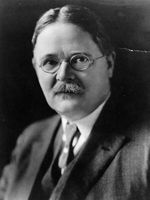Roscoe Pound

Roscoe Pound was an American legal scholar and professor. According to legal historian Stephen Presser, Pound "was the most famous American jurisprudential thinker of the first half of the twentieth century" and "the greatest twentieth-century dean of the Harvard Law School (1916–36)." His innovations in legal theory supported the idea that judges ought to consider the social consequences of their decisions instead of applying precedents in a mechanistic manner.[1][2]
Biography
Pound was born in Lincoln, Neb. in 1872 and studied botany at the University of Nebraska. He later earned a Ph.D. in the field in 1897. After a year of Harvard Law School, Pound returned to Nebraska and was admitted to the bar as a lawyer in 1890. He taught at the University of Nebraska and helped organized the Nebraska State Bar Association in 1900. In 1901, Pound was appointed as a commissioner of appeals to the Nebraska Supreme Court and then, in 1903, as dean of the Nebraska College of Law.[1]
After giving a speech on his theory of law, sociological jurisprudence, Pound joined the faculty of Northwestern University School of Law in 1907. At Northwestern, Pound organized the First National Conference on Criminal Law and Criminology. He then worked at the University of Chicago for a year before joining Harvard Law School in 1910. He became dean of Harvard Law in 1916 and served in that role until 1936.[1][2]
Pound became the first university professor at Harvard after stepping down as dean of the law school. He eventually opposed President Franklin Roosevelt's New Deal programs that expanded federal administrative agencies into what he believed were traditional legislative functions. The American Bar Association gave Pound a medal in 1940 for his work. He helped Chiang Kai-shek reorganize the Chinese judicial system from 1946 to 1949 and died in 1964 in Cambridge, Mass.[1][3]
Academic scholarship
Pound wrote more than 300 treatises and books during his lifetime. The following table contains a selection of works by Pound about the administrative state and related issues. Any links in the table below feature Ballotpedia summaries of that scholarly work.
| Works related to the administrative state | |||
|---|---|---|---|
| Title | Source | ||
| "Jurisprudence" | West (1959) | ||
| "Sociology of Law and Sociological Jurisprudence" | University of Toronto Law Journal (1943) | ||
| "Interpretations of Legal History" | Harvard University Press (1923) | ||
| "An Introduction to the Philosophy of Law" | Yale University Press (1922) | ||
| "The Spirit of the Common Law" | Marshall Jones (1921) | ||
| "The Scope and Purpose of Sociological Jurisprudence" | Harvard Law Review (1912) | ||
| "Law in Books and Law in Action" | American Law Review (1910) | ||
| "Liberty of Contract" | Yale Law Review (1909) | ||
| "Mechanical Jurisprudence" | Columbia Law Review (1908) | ||
| "The Need of a Sociological Jurisprudence" | GreenBag (1907) | ||
| "The Causes of Popular Dissatisfaction With the Administration of Justice" | American Judicature Society (1906) | ||
| "Outlines of Lectures on Jurisprudence" | Harvard University Press (1903) | ||
See also
- Ballotpedia's administrative state coverage
- Administrative State Bibliography
- Scholarly work related to the administrative state
External links
Footnotes
- ↑ 1.0 1.1 1.2 1.3 West's Encyclopedia of American Law, edition 2, "Roscoe Pound," accessed October 11, 2018 on https://legal-dictionary.thefreedictionary.com/Roscoe+Pound
- ↑ 2.0 2.1 Liberty Fund, "Foreward to The Ideal Element in Law ed. Stephen Presser, 2002," accessed October 11, 2018
- ↑ Cite error: Invalid
<ref>tag; no text was provided for refs namedcrimson




